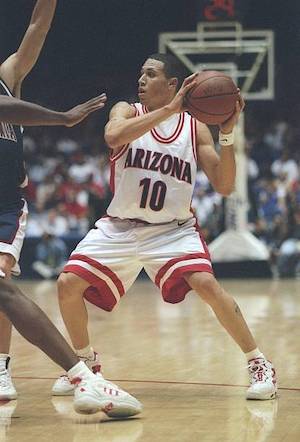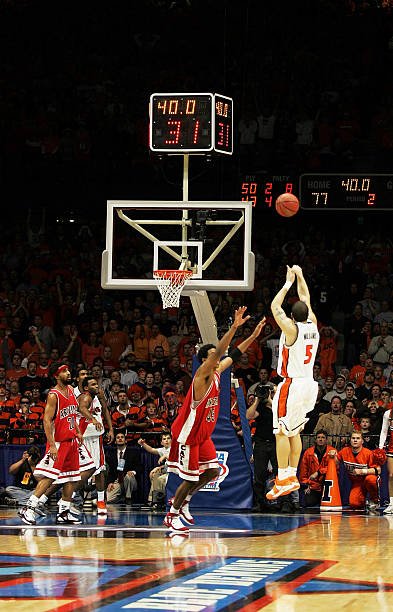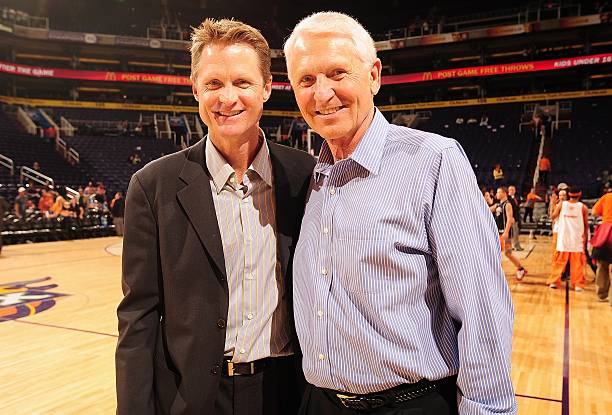
By Dane Miller, SuperWest Sports
August 28, 2020
Yes, I know, I’m supposed to be unbiased. It’s unseemly to be a fan of a team you cover. That’s the sportswriter’s code.
Well, on August 27, 2020, you’ll forgive me if I put all that aside for one night.
Since his arrival in 1983, Lute Olson has defined Tucson. A city of roughly one million people in a relatively low-income tax bracket. An out-of-the way place where property crime is rampant, and you don’t need a permit to carry a concealed weapon.

Growing up here, you learn pretty fast that you don’t have much to feel proud about.
People from Phoenix constantly talk you down, like you come from some backwater woods. Trips to Southern California, a mere six-hour drive away, seem like a dream. But the negative vibe remains.
“Why do you live in Tucson?”
Many who grow up here move away. For better jobs. Better weather. A better life.
The one constant, the one shining beacon of hope, is the basketball team. Around here, it’s known simply as “UofA.” Because for many, Arizona basketball is the University.
By the time you are five years old, you know what that means. The block “A.” The rhythm of “Bear Down Arizona.” The expectation for greatness whenever a basketball is tipped off in McKale Center.
Lute Olson built that.

For many, he created everything that unites the city. From the upscale foothills to the gritty corner of First and Prince, Wildcat basketball jerseys can be seen in every neighborhood. Kids grow up wanting to be like UofA hoops stars. For me, it was Mike Bibby, Gilbert Arenas, and Salim Stoudamire.
That may sound like hyperbole to outsiders, but if you grew up here, you know what I mean. Your first game was probably in the nose-bleed seats, waaaay up there, where your view was obstructed by adults and some inconveniently placed concrete columns. But you didn’t mind. Just getting a glimpse of the floor was enough.
You couldn’t help thinking, “This is what it means to be a Tucsonan.” This is Arizona.
My first memory of Lute Olson and Arizona basketball came on March 31, 1997. I was four years old, and we were watching the Wildcats play on TV in the national championship game against Kentucky. There were lots of joyous screaming and yells.
“UofA wins!”
I remember asking “What’s UofA?”
“It’s a school,” my mom told me. I brushed it off and starting jumping around, just enjoying the happiness of the moment, oblivious to the source of my exuberance.
Flash forward four years to April 2, 2001. I am eight years old and Arizona is facing Duke in the National Championship. Duke’s Jay Williams is draped over the back of Jason Gardner. No foul is called. The Wildcats lose by 10.
I’ve never felt hollower in my life. No matter how much you cry, it doesn’t change the facts. You lost. They won.

Speed ahead four more years to March 26, 2005. I’m 12 and Arizona is battling Illinois in the Elite 8. Salim Stoudamire is having an off night, but Channing Frye and Hassan Adams are making up for it. The Cats are up 15 with four minutes to go, another Final Four and National Championship seems destined.
What happens next will never be forgotten.
The Illini claw their way back after several Arizona turnovers, forcing overtime. Down one with a few seconds left, Lute Olson calls a timeout. Surely he is drawing up a play to get Salim the ball. A master at his craft, Olson uses the three-point marksman as a decoy and Adams gets an open look.
His shot misses the mark. The Illini storm the court.
That collapse hurt me to my very core. I’ve never cried so hard, for so long. Arizona was supposed to win the National Championship. Stoudamire was too good. Frye was too sensational.
If you had told me, while I was shooting baskets in my driveway after the game, that my beloved Wildcats wouldn’t make it to another Final Four for more than 15 years, I would have looked in your eyes, tears streaming from mine, and told you I absolutely believed it.
Because at that moment, it felt as though something changed. We just knew. And that’s why it hurt so much.
In many ways, it was the loss in the 2005 Elite 8 that marked the end of Olson Era magic. Two years later, at the end of the 2006-07 season, he retired. Then it really was over.
Those three boyhood memories of Lute Olson teams will stick with me forever, as both the greatest and toughest moments in my life. They are emotions that my later training as an attorney and as a sportswriter could never touch.
What Olson built can’t ever be touched either.
While at Arizona, he compiled a 589-187 record with four Final Fours, one National Championship, 15 Pac-10 Regular Season and Tournament Championships, and 23 winning seasons in his 24 years in the Old Pueblo. He put numerous legends into the NBA, including Andre Iguadola, Jason Terry, and Richard Jefferson, to name just a few.
One of them, Steve Kerr, won five NBA championships as a player, and three more as a coach. It’s nearly impossible to imagine any of that happening if he hadn’t played for Olson.

Upon hearing of his former coach’s passing, Kerr tweeted: “It’s hard to put into words how much Lute Olson meant to me. He was an amazing coach & a wonderful man. Being part of the U of A basketball family changed my life forever.”
That’s what Olson and his late wife Bobbi did. They changed lives. They made everyone feel like family, from the players and team managers to fans, businesspeople, and city officials.
He built the Arizona basketball family virtually from nothing.
Families and strangers alike come together in Tucson to watch Arizona play because of what Lute created. It’s a fandom that’s passed down from generation to generation, from father to son and mother to daughter. Even newcomers can’t resist its allure.
It’s what unites us as a city. It’s what drives the Arizona athletics twitter mob. It’s what stirs animosity among other fan bases. And Wildcat fans everywhere—even those who put on a sportswriter’s face for games—still expect to win. Because of Lute.
 I was born in Tucson in 1992. I grew up and have lived here most of my life. Arizona was the only school I applied to out of high school, the only school I could imagine myself attending because of the success that Olson built.
I was born in Tucson in 1992. I grew up and have lived here most of my life. Arizona was the only school I applied to out of high school, the only school I could imagine myself attending because of the success that Olson built.
My senior year of college, the Cats were undefeated and No. 1 in the nation for most of the season. Until Brandon Ashley broke his foot at California, and Arizona lost in the Elite 8 again, this time in overtime to Wisconsin.
Still, my experience at the University felt like destiny. It was just meant to be. Like the city’s love affair with its legendary coach.
It’s fair to say that Olson had a major impact on the person I am today. I never would have cared so much about college basketball if he didn’t build up Arizona the way he did. I never would have developed so much pride in Tucson. And after leaving town for law school, I never would have come back here to practice.
I’m not alone in my memories and emotions. Far from it.
Hundreds of thousands of other Tucsonans could tell you a similar story. The impact he had on all of us can never be overstated. Season ticket-holders of the past 40 years, and fans who can only afford a few games in their lifetime, all share a common sentiment at this moment.
Lute Olson won’t ever be forgotten.
-
Ranking the Big 12 Football Head Coaches for 2025
> Dane Miller gives us his assessment of how the 16 top guys stack up heading into the fall - July 4, 2025 -
The Top 10 Surprise Teams in the West for 2025
> College football programs in the region most likely to overachieve in the upcoming season - June 20, 2025 -
Top 10 Teams Most Likely to Make the Playoff from the West
> Our Dane Miller evaluates the region's programs with the best shot at the 2025-26 CFP - June 6, 2025

